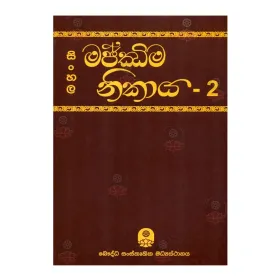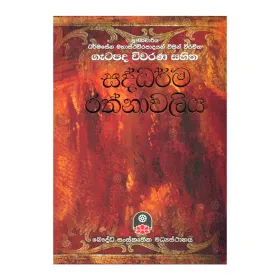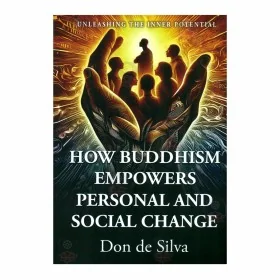Tripitaka - 57 Complete Set of Books
Discipline The Canonical Buddhism of Vinayapitaka
Discipline The Canonical Buddhism of Vinayapitaka - Discipline: The Canonical Buddhism of the Vinayapitaka is a penetrating analysis of a heretofore neglected, yet centrally important portion of the Pali Canon. In identifying the pivotal role of discipline in the bhikkhu quest for nibbana Professor Holt finds that Vinaya rules represent a practical implementation of the Buddha’s Dhamma. Specifically adherence to this monastic code theoretically facilitates an overcoming of asavas, mental dispositions that foster attachment to the “self” and thus perpetuate the process of samsaric kammic retribution. The formulation of Buddhist monastic law, therefore, need not be seen as the result of casuistry, rather, it is the consequence of a conscious attempt on the part of the early Buddhist tradition to identify behavioral expressions that once generate and reflect a calmed, detached and disciplined mental and spiritual state. The author has also examined the significance of the principal rituals of Buddhist monasticism as they are prescribed within the Vinaya text. He interprets these rites as cultic celebrations of discipline which, in turn, legitimate the Sangha’s claim to be the embodiment and reservoir of the Buddha’s teachings. The claim supported the Sangha’s role of occupying a mediating position between the spiritual needs of the laity and the authority and the spiritual exemplar of Buddhism, the Buddha. In short, Discipline, written from the perspective of the history of religious approach, contributed significantly to the increased understanding of the dynamics of the Buddhist religion in its formulative stages.
Terms and conditions of use
Discipline: The Canonical Buddhism of the Vinayapitaka is a penetrating analysis of a heretofore neglected, yet centrally important portion of the Pali Canon. In identifying the pivotal role of discipline in the bhikkhu quest for nibbana Professor Holt finds that Vinaya rules represent a practical implementation of the Buddha’s Dhamma. Specifically adherence to this monastic code theoretically facilitates an overcoming of asavas, mental dispositions that foster attachment to the “self” and thus perpetuate the process of samsaric kammic retribution. The formulation of Buddhist monastic law, therefore, need not be seen as the result of casuistry, rather, it is the consequence of a conscious attempt on the part of the early Buddhist tradition to identify behavioral expressions that once generate and reflect a calmed, detached and disciplined mental and spiritual state. The author has also examined the significance of the principal rituals of Buddhist monasticism as they are prescribed within the Vinaya text. He interprets these rites as cultic celebrations of discipline which, in turn, legitimate the Sangha’s claim to be the embodiment and reservoir of the Buddha’s teachings. The claim supported the Sangha’s role of occupying a mediating position between the spiritual needs of the laity and the authority and the spiritual exemplar of Buddhism, the Buddha. In short, Discipline, written from the perspective of the history of religious approach, contributed significantly to the increased understanding of the dynamics of the Buddhist religion in its formulative stages.
Publisher :
ISBN :
Pages :
Weight :
Binding : Soft Binding
English Name : Discipline The Canonical Buddhism of Vinayapitaka
- Language
- English
- Publisher
- Motilal Banarsidass Publishers
- Author
- John Clifford Holt
Shipping
The customer must choose from the following mail services that the BCC provides in the online purchase form:
- DHL
- Aramex
- AirMail
- Sri Lanka Post (Domestic)
Upon receipt of confirmation of payment, the Buddhist Cultural Center will release purchased books to the mail service selected by the customer in the online purchase form. The BCC hereby exempts itself from any and all responsibilities pertaining to the shipment or postage of goods. The time taken for delivery, and quality of service, will depend on the express mail service or shipping service selected by the customer in the online purchase form.
Returns Policy
In the case of returns, a formal complaint must be lodged (in writing) within 14 days of the purchase. The return of purchased items is only acceptable under the following circumstances:
- Manufacturing defects in items such as audio or video cassettes, CDs and DVDs.
- Printing or binding defects in printed material
- The shipment of an item that was not ordered, or the failure to ship an ordered item.
The Buddhist Cultural Center will bear no expense for postage of formal complaints, or returned items. The Buddhist Cultural Center is exempt from any and all liability pertaining to manufacturing defects if foul play is suspected or discovered.
Refund Policy
The BCC will consider a refund on a purchased item only if said item becomes unavailable after purchase. A request for a refund must be made within 2 days of the transaction. The average period of time taken for a refund can range between 14 and 21 days.
We have embarked on a programme of donating books to libraries in the island and Buddhist monastic institutions, as well as to the children who are unable to afford to purchase them. You too can participate in this act of great merit.













feedback Report comment